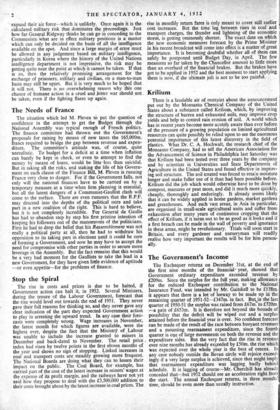The Needs of France
The situation which led M. Pleven to put the question of confidence in the attempt to get the Budget through the National Assembly was typical enough of French politics. The finance committee had thrown out the Government's proposals for raising by means of new taxes the 165,000m. francs required to bridge the gap between revenue and expen- diture. The committee's attitude was, of course, quite unrealistic. To budget for a deficit at a time when inflation can barely be kept in check, or even to attempt to find the money by means of loans, would be litte -less than suicidal. But in taking all the risks, and staking the life of his Govern- ment on each clause of the Finance Bill, M. Pleven is running France very close to danger. For if the Government falls, not only will the national finances have to be carried on by a temporary measure at a time when firm planning is essential, but all the latent dangers of a Communist-Gaullist clash will come to the surface. There are even rumours that the R.P.F. may descend into the depths of the political mire and take part in a new coalition of the right. This is hard to believe, but it is not completely incredible. For General de Gaulle has had to abandon step by step his first pristine intention of keeping his followers out of the manoeuvres of the -politicians. First he had to drop the belief that his Rassemblement was not really a political party at all, then he had to withdraw his opposition to its taking part in elections until it could be sure of forming a Government, and now he may have to accept the need for compromise with other parties in order to secure more leverage in the Assembly. But the fact remains that this would be a very bad moment for the Gaullists to take the lead in a new Government, for they have given little evidence of aptitude —or even appetite—for the problems of finance.






































 Previous page
Previous page